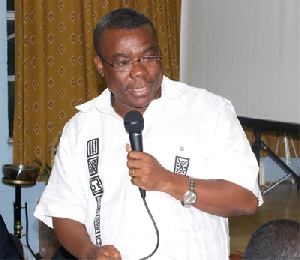 Campaign Manager of the NPP, Peter Mac-Manu
Campaign Manager of the NPP, Peter Mac-Manu
There is panic within the New Patriotic Party over suspicion that the party's 2016 manifesto, that highly kept secret, may once again have been leaked to the ruling National Democratic Congress, as it happened in 2012.
It is recalled that in 2012 the NDC artfully burst the NPP manifesto bubble by expropriating the theme, 'You Matter, People Matter'.
Afraid that the NDC will once again borrow from its manifesto, the NPP has chosen to bring out its manifesto promises one at a time, with the presidential candidate bringing them out in drips and drops as he tours the nation.
Notable among these have been the following: 1 District 1 Factory; creating a new region from Western Region, 1 Village 1 Dam, and the appointment of an independent prosecutor to serve as an anti-corruption czar.
But, the NDC appears to have outsmarted the NPP once again. The vaulted NPP manifesto, according to a deep source, has a specific pledge to increase the daily allowance for peacekeepers involved in UN operations to US$36 (GH¢142.56) per day per officer.
This, according to the NPP manifesto, will constitute a $5 increase from the current level of $31 per day, recently announced by President John Mahama on Thursday, August 11, 2016.
For the last 3 years, the Mahama administration kept the rate at $30 per troop, even though the UN since 2014 raised it significantly to $44 a day per person, or $1,332 per person a month.
The 2016 NPP Manifesto has been ready since it was originally scheduled to be released on Thursday, August 4. This original release date would have even preempted John Mahama's unpopular $31 per troop announced.
But, in a quick, dramatic turn, Government has in a matter of weeks, gone back to the drawing table to come up with a new figure of $35 per soldier per day. This has taken the steam off the NPP's $1,080 per month proposal.
Nevertheless, the NPP's proposed $36, if the party sticks to it, will mean that the opposition party's offer will still put an extra $30 (approximately GH¢120) a month into the pockets of each troop if elected.
The NPP calculation was based on a discovery that the Ghana Government had been shortchanging its UN troops, notably in the last three years.
By paying $30 a day after 2014, it meant the Ghana Government was holding on to $432 per troop per month, passing on just $900 of the allowance to every officer, police or soldier, serving on a UN peacekeeping mission.
The $31 would have seen Government's share going up to $435 a month.
On July 1, 2014, the United Nations came out with a new payment structure, representing significant increments on the $1,210 the troops were receiving monthly.
The UN General Assembly's Fifth Committee, which deals with the UN budget, approved a new troop-reimbursement package for all countries contributing troops. The new rates indicate that each troop was to receive $1,332 a month from July 2014, representing 17% –– the largest increase in 35 years.
This went up further to $1,365 per person per month from July 1, 2016. It is scheduled to go up further to $1,410 per person per month from July 1, 2017.
The NPP calculates that Government can afford to pay $36 a month without sweat. The $1,332 per troop per month the UN had paid since 2014 included $68 for clothing allowance. The NPP calculates that should the clothing allowance be raised to $80 that will still leave $1,262 per month or $41.73 per day.
The NPP is confident Government can pay each peacekeeping officer $36 a day, or $1,080 a month, leaving a balance of $171, $80 of which can go into clothing and the remainder on other non-monthly recurrent costs.
Government, for instance, claims that it uses the withheld amounts, (which will be $201, instead of $435, using the $35 per troop proposed rate), to cover pre-embarkation activities, such as medicals, training facilities maintenance, and training costs.
But, much of these pre-embarkation costs do not recur on monthly basis. The NPP believes $36 is generous enough to the troops, leaving a large enough balance to cover clothing and pre-embarkation expenses.
But, with this key manifesto pledge snatched from the opposition party seeking to unseat an incumbent, perhaps it is time for the NPP to rethink its strategy of waiting for the NDC to launch its manifesto first.
The NDC, meanwhile, appears somewhat comfortable fighting its re-election bid on the Green Book, which records both its achievements and intentions, many of which have been exposed to be exaggerated or done at highly inflated prices.